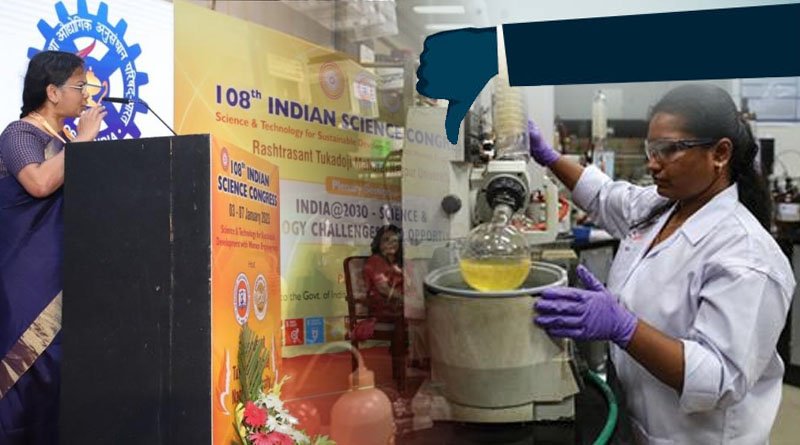The experts highlighted opportunities and challenges in science and technology in country. Kailselvi pointed out that India faces challenges in doing science at par with global standards.

India has some 255 researchers per million inhabitants even as the country produces more than 40,000 PhDs annually but still India is not producing quality research material, Ajay Sood, principal scientific adviser to the government said at an event at the Indian Science Congress January 3, 2023.
The United States, in contrast, has over 4,300 researchers per million inhabitants, Sood pointed out. “The number of publications in India has increased, but I am not happy about the quality of research material,” he said at a press briefing following the event.
Quality research material is essential for producing accurate and reliable research findings. In order to conduct high-quality research, it is important to use materials that are relevant, reliable, and valid.
The number of publications in high-impact journals was very low, according to the Comptroller and Auditor General of India (CAG) report released December 20, 2022.
The impact factor is a measure used to evaluate the importance of a journal. An impact factor of 10 or more is considered excellent. Only five publications had an impact factor of more than 10. The rest was published in journals with an impact factor of less than five.
Sood was joined by M Ravichandran, secretary, Union Ministry of Earth Sciences, S Chandrasekhar, secretary to the Government of India, Department of Science and Technology, N Kalaiselvi, director-general, Council of Scientific and Industrial Research and Alka Sharma, senior advisor of the Department of Biotechnology.
The experts highlighted opportunities and challenges in science and technology in the country. Kailselvi pointed out that India faces challenges in doing science at par with global standards.
During the event, Sood stressed that the government is in the final stages of the National Quantum Mission. The mission will involve four verticals: quantum computing, quantum communication, quantum sensors and metrology, and quantum materials and devices.
Of this, quantum communication is at an advanced stage. Its application is in cryptography, the science of protecting information.
He also highlighted the need to encourage deep-tech start-ups in the country. Currently, India ranks third in the number of start-ups. More than 77,000 start-ups across 656 districts exist in the country as of August 29, 2022. Of them, over 3,000 are deep tech start-ups.
More than 85 per cent of deep-tech start-ups used artificial intelligence, big tech and analytics, Sood said.
Ravichandran said the Blue Economy contributes almost 4 per cent to the gross domestic product. This needs to be increased to 8 per cent. The government is in the process of finalising a policy on the Blue Economy.
The draft policy covers seven areas: Accounting framework (monitoring ocean wealth), coastal marine spatial planning (ocean management), marine living resources (fisheries), manufacturing industries (shipbuilding, net making, deep-sea mining), logistics and shipping, marine non-living resources (energy, minerals and water), and international interface and maritime security (protecting biodiversity and strategic interests).
The earth sciences ministry also plans to increase ocean monitoring, essential to study how the ocean is changing due to climate change.
Buoys and Argo floats — which measure temperature — fell into disrepair due to the COVID-19 pandemic. Argo floats, for instance, reach up to a depth of 2 kilometres below the surface. After 10 days, it returns to the surface and transmits temperature records to the satellite.
“The buoys were damaged. The observing system reached a standstill,” Ravichandran told Down To Earth. “We are filling the gap this year. Hopefully, by next year, we’ll be in a good position,” he added.
“Every year, we deploy about 50 floats. It is being deployed across the Indian Ocean, and it will last for up to five years,” he explained. The ministry plans to use Argo floats that reach 3 km depth. They also aim to study deep-ocean biodiversity, which is poorly understood.
As for deep-sea mining, roughly 95 per cent of the technology is ready. We should reach 100 per cent in the next five years, Ravichandran said.
Deep-sea mining involves extracting ores rich in cobalt, manganese, zinc and other rare metals from the sea floor. He also added that researchers are conducting pilot trials to study the impact of mining operations on biodiversity.
Alka Sharma made a case for biomanufacturing, an alternative route that deploys microbes and plant waste to manufacture environmentally friendly materials such as insecticides, biotextiles, flavours and fragrances, food additives, and the like.
Chandrashekar encouraged research institutes to consider choosing research problems relevant to 2030. “The technologies we have developed over the years were essential. But in that process, we have ignored environmental factors,” he said. For example, he said, the pharmaceutical industries produce more waste than the product.
Originally published at DownToEarth